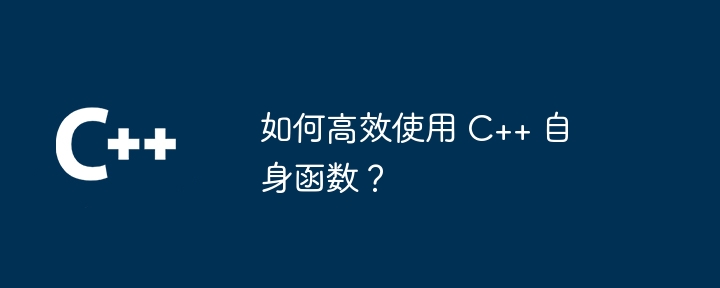利用 c++++ 自身函数优化代码:数组操作:使用 std::sort 函数对数组进行排序。字符串操作:使用 std::string::find 方法查找字符串中的子字符串。内存管理:使用 std::make_unique 函数创建唯一指针,防止内存泄漏。

如何有效利用 C++ 自身函数
C++ 标准库提供了大量实用函数,可以极大地简化我们的编程任务。本文将探讨几个常见的 C++ 自身函数,并通过实战案例展示其用法。
1. 数组操作:std::sort
std::sort 函数可对数组进行排序。其语法如下:
std::sort(arr, arr + n); // arr 是数组名,n 是数组长度
实战案例:
#include <iostream>
#include <algorithm>
void printArray(int arr[], int n) {
for (int i = 0; i < n; i++) {
std::cout << arr[i] << " ";
}
std::cout << std::endl;
}
int main() {
int arr[] = {5, 1, 3, 2, 4};
int n = sizeof(arr) / sizeof(arr[0]);
std::cout << "Unsorted array: ";
printArray(arr, n);
std::sort(arr, arr + n);
std::cout << "Sorted array: ";
printArray(arr, n);
return 0;
} 输出:
Unsorted array: 5 1 3 2 4 Sorted array: 1 2 3 4 5
2. 字符串操作:std::string
std::string 类提供了丰富的字符串操作功能。以下是一个常用方法的介绍:
std::string::find(substr)
此方法可以在字符串中查找子字符串 substr 的第一个匹配项,返回它的索引位置。-1 表示未找到。
实战案例:
#include <iostream>
#include <string>
int main() {
std::string str = "Hello World!";
std::cout << str << std::endl;
std::cout << "Index of 'World!': " << str.find("World!") << std::endl;
return 0;
} 输出:
Hello World! Index of 'World!': 6
3. 内存管理:std::make_unique
std::make_unique 函数用于创建唯一指针,防止内存泄漏。
std::make_unique<Type>(args...);
实战案例:
#include <iostream>
#include <memory>
class MyClass {
public:
MyClass() { std::cout << "Constructor called" << std::endl; }
~MyClass() { std::cout << "Destructor called" << std::endl; }
};
int main() {
// 创建唯一指针
std::unique_ptr<MyClass> ptr = std::make_unique<MyClass>();
// 使用 ptr
// 删除 ptr
ptr.reset();
return 0;
} 输出:
Constructor called Destructor called
有效利用 C++ 自身函数可以提高你的编程效率,带来更简洁和高效的代码。
以上就是如何高效使用 C++ 自身函数?的详细内容,更多请关注知识资源分享宝库其它相关文章!







发表评论:
◎欢迎参与讨论,请在这里发表您的看法、交流您的观点。